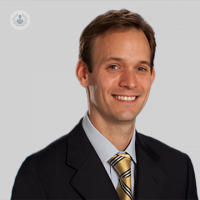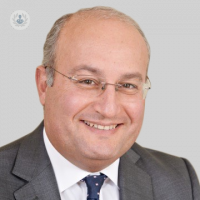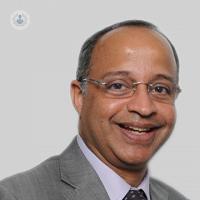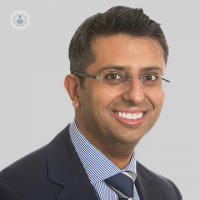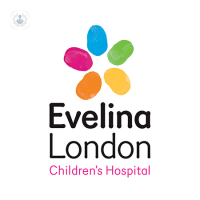What is hearing loss?
Hearing loss is a reduction in hearing sensitivity affecting one or both ears. It can be classified by type and degree.
There are three main types of hearing loss:
- Sensorineural hearing loss: caused by nerve damage to the inner ear. This is often permanent.
- Conductive hearing loss: affects the external or middle ear, making it difficult for sound to move from the outer ear to the eardrum and middle ear. Medicine or surgery can help improve this type of hearing loss.
- Mixed hearing loss: a combination of both of the above.

The different degrees of hearing loss are as follows:
- Mild hearing loss: it can be hard to understand speech in noisy environments.
- Moderate hearing loss: it can be difficult to understand speech without a hearing aid.
- Severe or profound hearing loss: a hearing aid or implant are required to hear.
Symptoms of hearing loss
Some of the most common symptoms are:
- Difficulty following conversations when two or more people are talking.
- Difficulty differentiating between high-pitched sounds.
- Deeper or more masculine voices are heard better.
- Sensation of being unsteady or of dizziness.
- Sensation of pressure in the ear.
Other symptoms may include:
- Loss of balance or dizziness
- Constant buzzing
What are the causes of hearing loss?
Causes of hearing loss include:
- Age: people aged over 65 years may experience hearing loss.
- Noise: prolonged exposure to loud noises may lead to hearing loss.
- Hereditary factors
- Infections: viruses and bacteria may harm the ear, in addition to untreated childhood otitis.
- Otosclerosis affects the mobility of bones of the middle ear, reducing their ability to transmit vibrations.
- Ototoxic agents: certain medications, alcohol and tobacco may harm the ear.
Can hearing loss be prevented?
Prevention is based on avoiding risk factors as much as possible. However, prevention is not possible for hearing loss of a genetic origin. In general, it is important to avoid exposure to high volumes and to use protective gear if you work in such an environment where noise is the norm.
What is the treatment?
Treatment depends on the degree of hearing loss. The conventional treatment for mild or moderate hearing loss is a hearing aid. In cases of profound hearing loss, a bone-anchored hearing aid may be implanted; this device transmits sound via the cranium to the affected ear.
11-13-2012 04-24-2024Hearing loss
Mr Richard Hewitt - Paediatric otolaryngology
Created on: 11-13-2012
Updated on: 04-24-2024
Edited by: Aoife Maguire
What is hearing loss?
Hearing loss is a reduction in hearing sensitivity affecting one or both ears. It can be classified by type and degree.
There are three main types of hearing loss:
- Sensorineural hearing loss: caused by nerve damage to the inner ear. This is often permanent.
- Conductive hearing loss: affects the external or middle ear, making it difficult for sound to move from the outer ear to the eardrum and middle ear. Medicine or surgery can help improve this type of hearing loss.
- Mixed hearing loss: a combination of both of the above.

The different degrees of hearing loss are as follows:
- Mild hearing loss: it can be hard to understand speech in noisy environments.
- Moderate hearing loss: it can be difficult to understand speech without a hearing aid.
- Severe or profound hearing loss: a hearing aid or implant are required to hear.
Symptoms of hearing loss
Some of the most common symptoms are:
- Difficulty following conversations when two or more people are talking.
- Difficulty differentiating between high-pitched sounds.
- Deeper or more masculine voices are heard better.
- Sensation of being unsteady or of dizziness.
- Sensation of pressure in the ear.
Other symptoms may include:
- Loss of balance or dizziness
- Constant buzzing
What are the causes of hearing loss?
Causes of hearing loss include:
- Age: people aged over 65 years may experience hearing loss.
- Noise: prolonged exposure to loud noises may lead to hearing loss.
- Hereditary factors
- Infections: viruses and bacteria may harm the ear, in addition to untreated childhood otitis.
- Otosclerosis affects the mobility of bones of the middle ear, reducing their ability to transmit vibrations.
- Ototoxic agents: certain medications, alcohol and tobacco may harm the ear.
Can hearing loss be prevented?
Prevention is based on avoiding risk factors as much as possible. However, prevention is not possible for hearing loss of a genetic origin. In general, it is important to avoid exposure to high volumes and to use protective gear if you work in such an environment where noise is the norm.
What is the treatment?
Treatment depends on the degree of hearing loss. The conventional treatment for mild or moderate hearing loss is a hearing aid. In cases of profound hearing loss, a bone-anchored hearing aid may be implanted; this device transmits sound via the cranium to the affected ear.


Managing the stress - tinnitus/tinnitus - stress cycle
By Professor Mahmood Bhutta
2024-11-21
Tinnitus isn't necessarily the damaged caused, it's when it's triggered long after that occurred. And that trigger can be stress. Then, of course, tinnitus can lead to stress. So, a frustrating cyclical issue can arise. Leading ENT specialist Professor Mahmood Bhutta tells us all about the tinnitus - stress/stress - tinnitus cycle, and what's involved in managing it in this informative article. See more


What causes balance problems?
By Miss Victoria Alexander
2024-11-20
The ability to balance depends on various factors. This includes on how well the brain, nerves, eyes, muscles and joints, function, as well as the vestibular system, which is the group of structures behind the ear drum. Leading consultant adult & paediatric ENT surgeon Miss Victoria Alexander looks at the most common causes of balance problems in connection to the vestibular system, their symptoms and treatment. See more


Cochlear implants: life-transforming technology for hearing loss patients
By Professor Manohar Bance
2024-11-20
Cochlear implants can transform the lives of many people, restoring hearing loss in adults and children who have severe to profound inner hearing loss. In this article, Professor Manohar Bance, one of the UK’s leading otologists, gives us an overview of cochlear implants. See more


Hearing loss (Part 2): Cochlear Implants and Hearing Aids
By Mr Harry Powell
2024-11-20
Hearing loss is the reduction in hearing ability that develops when electrical sound signals do not reach the brain. In the conclusion of a two-part series on hearing loss, Mr Harry Powell, leading consultant ENT surgeon, offers an expert insight into the use of cochlear implants and hearing aids as treatment options. See more
Experts in Hearing loss
-
Mr Anthony Aymat
Otolaryngology / ENTExpert in:
- Cholesteatoma
- Ear infection
- Tinnitus
- Vertigo
- Voice disorders
- Hearing loss
-
Mr Abhijeet Parikh
Otolaryngology / ENTExpert in:
- Hearing loss
- Otosclerosis
- Cholesteatoma
- Rhinitis
- Nasal polyps
- Voice disorders
-
Mr Michael Kuo
Otolaryngology / ENTExpert in:
- Paediatric ENT
- Hearing loss
- Voice disorders
- Blocked nose
- Sleep apnoea
- Neck lump
-
Mr Javier Moraleda
Otolaryngology / ENTExpert in:
- Vertigo
- Dizziness
- Hearing loss
- Tinnitus
- Ear wax plugs
- Middle ear surgery
-
Mr Sam Khemani
Otolaryngology / ENTExpert in:
- Sinusitis
- Tonsillitis
- Paediatric ENT
- Glue ear
- Nasal polyps
- Hearing loss
- See all

The Ridgeway Hospital - part of Circle Health Group
The Ridgeway Hospital - part of Circle Health Group
Moormead Rd, Wroughton, Swindon SN4 9DD
No existe teléfono en el centro.
By using the telephone number provided by TOP DOCTORS, you automatically agree to let us use your phone number for statistical and commercial purposes. For further information, read our Privacy Policy
Top Doctors

The Wellington Hospital - part of HCA Healthcare
The Wellington Hospital - part of HCA Healthcare
Wellington Hospital South Bldg, 8A Wellington Pl, NW8 9LE
No existe teléfono en el centro.
By using the telephone number provided by TOP DOCTORS, you automatically agree to let us use your phone number for statistical and commercial purposes. For further information, read our Privacy Policy
Top Doctors

Evelina London Children's Hospital Private Healthcare
Evelina London Children's Hospital Private Healthcare
Floor 1 St Thomas' Hospital, Westminster Bridge Road, London. SE1 7EH
No existe teléfono en el centro.
By using the telephone number provided by TOP DOCTORS, you automatically agree to let us use your phone number for statistical and commercial purposes. For further information, read our Privacy Policy
Top Doctors
-
The Ridgeway Hospital - part of Circle Health Group
Moormead Rd, Wroughton, Swindon SN4 9DD, SwindonExpert in:
- Breast Cancer
- General Surgery
- Orthopaedic surgery
- Plastic surgery, reconstructive and aesthetics
- Refractive surgery
- Cancer screening clinic
-
The Wellington Hospital - part of HCA Healthcare
Wellington Hospital South Bldg, 8A Wellington Pl, NW8 9LE, Central LondonExpert in:
- Digestive
- Cardiology
- Orthopaedic surgery
- Orthopaedic spinal surgery
- Intensive care
- Spine
-
Evelina London Children's Hospital Private Healthcare
Floor 1 St Thomas' Hospital, Westminster Bridge Road, London. SE1 7EH, SE1 South Bank LondonExpert in:
- Paediatric Dermatology
- Child development
- Child Nutrition
- Paediatrics
- Preventive paediatrics
- Child health surveillance
- Most viewed diseases, medical tests, and treatments
- Migraine
- Paediatric rheumatology
- Autoimmune diseases
- Joint pain
- Child nutrition
- Nutrition
- Abdominal pain
- Minimal access surgery (keyhole surgery)
- Head and neck cancer
- Neck lump
